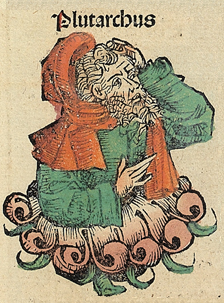Interview with Faculty Fellow Zoe Stamatopoulou
From Imperial Rome to the modern day, the writings of Plutarch, an ancient philosopher, scholar and biographer, have offered lessons on leadership. A new project by Zoe Stamatopoulou, associate professor of classics and a Faculty Fellow in the Center for the Humanities for the spring 2021 semester, singles out one of his lesser known works for closer analysis. Read on for more of Stamatopoulou’s “Plutarch’s Symposium of the Seven Sages: A Commentary and a Translation.”
Briefly, what is your project about?
I am currently working on a translation of and a commentary on Plutarch’s Symposium of the Seven Sages, a dialogue also known by the title Dinner (or Banquet) of the Seven Sages. This work is very rich in content as the banqueters discuss a broad variety of topics; however, the conversation keeps returning to the theme of governance, which is explored through discussions about the proper management of the state, the household and the self. My two projects, the commentary and the translation, complement each other and aim at making this neglected work more accessible and widely known among specialists as well as nonspecialists.
The commentary provides the support one needs to read the dialogue in the original Greek and suggests certain interpretive approaches. It includes an exegesis of the text with notes on the language and the content and other pertinent information. In addition, it offers an introduction to the author’s life and style, and an overview of the various traditions that inform this particular dialogue. The translation, on the other hand, is intended to appeal to a broader readership, offering essential notes and a basic introduction.

Who was Plutarch? How does he figure into the Greek tradition of dialogues?
Plutarch was an intellectual powerhouse of the late 1st and early 2nd c CE (ca. 45–ca. 125 CE). Today he is best known for his biographies, but he also produced a rich corpus of diverse non-biographical works, including essays on practical ethics, works that explore Greek and Roman cultural practices, and treatises offering political advice.
Some of these non-biographical works are dialogues, a literary form that allows Plutarch to present different opinions in a vivid and engaging manner. As a lifelong student of Greek philosophy, Plutarch was very familiar with the philosophical dialogue, a genre which we tend to associate almost exclusively with Plato but was, in fact, adopted by other philosophers as well. Some of Plutarch’s dialogues, including the Symposium of the Seven Sages, dramatize the discussion of philosophical and other questions specifically in a convivial setting. In the prologue to the first book of his Table Talk, a collection of convivial scenes, Plutarch situates this work explicitly within a long tradition that he traces back to Plato, Xenophon and Aristotle.
You’ve noted that Plutarch’s inclusion of women in the work is unusual. How so, and why is that important?
The Symposium of the Seven Sages features two female figures: Melissa, the host’s wife, and Eumetis (aka Cleobulina), who is the young daughter of one of Sages. These two female characters eat alongside the male banqueters but retire from the convivial space soon after the meal is over. Their presence is remarkable for several reasons. To begin with, Plutarch is projecting onto the past a practice that was acceptable in his own era but, as far as we know, not in the 6th century BCE, when this fictional dialogue is set. The archaic and classical symposion was reserved for male members of the elite and excluded “respectable” women; the only females allowed in the convivial space were enslaved stewards as well as performers and prostitutes.
Plutarch lets freeborn elite women into his fictional banquet, but still circumscribes the extent of their attendance. Furthermore, both female characters embody what Plutarch considered exemplary behavior for women, thus contributing to the education of his readership, both male and female. Both women are portrayed as beneficial to the male head of their household (Melissa’s husband; Eumetis’ father), and both remain silent within the male-dominated convivial space. The case of Eumetis is particularly interesting because she is praised for being extraordinarily intelligent and a positive influence upon her father’s leadership. She is also said to be world-famous for her riddles, some of which are performed, criticized and defended by the male banqueters in the dialogue, while she sits in silence and voluntarily represses her voice. The fact that the Symposium pays attention to Melissa and Eumetis at all is exceptional when one compares this dialogue with Plutarch’s other sympotic work, the Table Talk, a collection of convivial vignettes in nine books which features a rich cast of banqueters, none of them female.
Both Plutarch and modern literature on management agree on a fundamental point: Good leadership entails a constant learning curve and thus requires an open mind.
How does the Symposium compare with today’s business/organizational leadership best-sellers?
I must confess that I haven’t read many leadership best-sellers lately but, from what I gather, there are interesting points of convergence between these works and Plutarch’s Symposium. In terms of form, Plutarch’s dialogue and the modern self-help handbook are clearly two different genres; there is something to be said, however, about the use of anecdotes and hypothetical scenarios in the latter. These case studies, which often involve dialogue, are presented as paradigms for the reader to engage with critically, to assess and to emulate or reject. Similarly, Plutarch’s Symposium dramatizes interactions and intellectual exchanges that stimulate the readers to think critically but also teaches them something about proper behavior and communication, especially in elite convivial contexts. In terms of content, both Plutarch and modern literature on management agree on a fundamental point: Good leadership entails a constant learning curve and thus requires an open mind.
Furthermore, Plutarch’s Symposium emphasizes — at least according to my interpretation — how crucial proper mentorship and competent advisers are for good leadership. Networks mattered in Plutarch’s world as much as they do in modern corporate culture, and the Symposium stresses the benefits of associating with the right people.
In this dialogue, finally, Plutarch’s approach to leadership is guided by pragmatism rather than idealism, an approach that he shares with at least some modern handbooks. Looming in the background of the Symposium is the Platonic ideal of the philosopher-king who lives in moderation and inspires loyalty with his virtue and competence; clearly, the ruler who hosts the Sages in the dialogue falls short of this ideal, and yet his political leadership is portrayed as adequately efficient and viable.
Who was Plutarch writing for? How were these ideas received in his own era, and how are they relevant today?
Plutarch wrote exclusively in Greek but his intended readership encompassed not only educated Greeks but also members of the Roman elite, as well as other non-Greeks with proficiency in the language and an interest in Plutarch’s intellectual projects. The reception of his works and ideas is a vast topic, and there is now an excellent volume of 724 pages, edited by Sophia Xenophontos and Katerina Oikonomopoulou (Brill, 2019), which offers a survey of Plutarch’s rich reception history from the Roman Imperial period through Late Antiquity and Byzantium to the Renaissance, Enlightenment and the modern era. Plutarch’s works are so numerous and diverse that they have something to offer to most modern readers, whether they are interested, for instance, in military and social history, ethics, leadership or women in antiquity.
Headline image: “The Symposium (The Seven Sages of Greece)” by Pietro Testa, date unknown, courtesy the National Galleries of Scotland (CC BY-NC 2.0)





